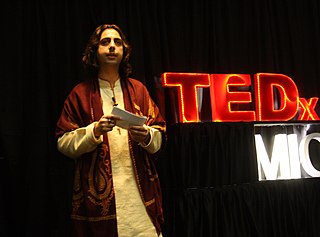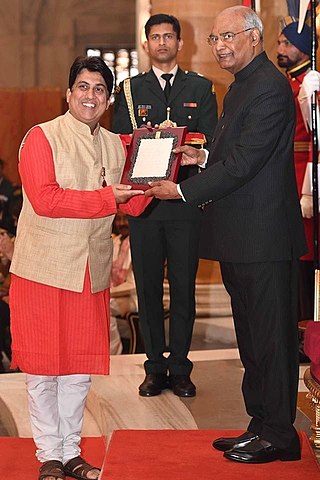
Maharaj Krishen Raina, popularly known as M. K. Raina, is an Indian theatre actor and director. Raina graduated from National School of Drama in 1970 with the Best Actor award.
Moti Lal Kemmu was an Indian contemporary playwright from Jammu and Kashmir. He was born in Srinagar into a Kashmiri Pandit family and attended Jammu and Kashmir University. His plays include Nagar Udas, Teen Asangati Aikanki (1968), Lal Drayas Lol Re (1972), Trunove (1970), Tshai (1973), Natak Truche (1980), Tota Tol Aina (1985).

Sangeet Natak Akademi is the national level academy for performing arts set up by the Government of India.

Pandit Bhajan Sopori was an Indian instrumentalist. He was a player of the santoor, an ancient stringed musical instrument.

Thetakudi Harihara Vinayakram, also known as Vikku Vinayakram, is an Indian percussionist. He is also known as the God of ghatam. He plays Carnatic music with the ghatam, an earthen pot, and is credited with popularising the ghatam.
Sombhu Mitra was an Indian film and stage actor, director, playwright, reciter and an Indian theatre personality, known especially for his involvement in Bengali theatre, where he is considered a pioneer. He remained associated with the Indian People's Theatre Association (IPTA) for a few years before founding the Bohurupee theatre group in Kolkata in 1948. He is most noted for films like Dharti Ke Lal (1946), Jagte Raho (1956), and his production of Rakta Karabi based on Rabindranath Tagore's play in 1954 and Chand Baniker Pala, his most noted play as a playwright.
Ratan Thiyam is an Indian playwright and theatre director, and the winner of Sangeet Natak Akademi Award in 1987, one of leading figures of the "theatre of roots" movement in Indian theatre, which started in the 1970s. Also known as Thiyam Nemai, Ratan Thiyam is known for writing and staging plays that use ancient Indian theatre traditions and forms in a contemporary context. A former painter, and proficient in direction, design, script and music, Thiyam is often considered one of leading contemporary theatre gurus.

Zohra Mumtaz Sehgal was an Indian actress, dancer, and choreographer. Having begun her career as a member of a contemporary dance troupe, she transitioned into acting roles beginning in the 1940s. Sehgal appeared in several British films, television shows, and Bollywood productions in a career that spanned over eight decades.

Guru Mayadhar Raut is an Indian classical Odissi dancer, choreographer and Guru.

Abhay Rustum Sopori is an Indian Santoor player, music composer and conductor. He is the son of Santoor player Pandit Bhajan Sopori, known for his versatility, innovations and experimentation. Sopori has received awards in recognition of his contribution in the field of music, and is one of the youngest recipients of awards such as 'Bharat Shiromani Award' & 'Ustad Bismillah Khan Yuva Puraskar'. Abhay was invited to speak at the international conference TEDx.

Padma Sachdev was an Indian poet and novelist. She was the first modern woman poet of the Dogri language. She also wrote in Hindi. She published several poetry collections, including Meri Kavita Mere Geet, which won the Sahitya Akademi Award in 1971. She also received the Padma Shri, India's fourth highest civilian award in 2001, and the Kabir Samman for poetry for the year 2007-08 given by Government of Madhya Pradesh, Saraswati Samman for the year 2015, Sahitya Akademi Fellowship in 2019.
Jitendra Udhampuri is an Indian writer of Dogri, Hindi and Urdu literature. He is a recipient of the Sahitya Akademi Award in 1981. The Government of India honored him in 2010, with the fourth highest civilian award of Padma Shri.
Nilamber Dev Sharma was an Indian scholar and writer of Dogri and English literature, best known for his work, An Introduction to Modern Dogri Literature, the first publication in English about Dogri literature. The Government of India honored Sharma in 2011, with the fourth highest civilian award of Padma Shri.
Daji Bhatawadekar, was an Indian theatre personality and film and television actor. He was credited with the revival of Sanskrit and Marathi theatre in India. A winner of the Sangeet Natak Akademi award in 1965, he was honoured by the Government of India in 1967, with the award of Padma Shri, the fourth highest Indian civilian award for his contributions to the society.
Govind Ram Nirmalkar (1935–2014) was an Indian actor and folk theatre artist, known for his contributions to the Nacha folk theatre of Chhattisgarh. His portrayal of the protagonist in Charan Das Chor, an award winning play by Habib Tanveer, won him critical acclaim. The Government of India awarded him the fourth highest civilian honour of the Padma Shri, in 2009, for his contributions to Arts. He was also a recipient of the 2012 Sangeet Natak Akademi Award.

Niranjan Goswami is an Indian mime artist and stage director, credited by many with pioneering the art form of mime in India. He is the founder of Indian Mime Theatre, a group promoting the art of Mukhabhinaya.
Vedantam Satyanarayana Sarma (1935–2012), popularly known as Satyam, was an Indian classical dancer and choreographer, considered by many as one of the leading exponents of the classical dance form of Kuchipudi. He was known for his portrayal of female characters such as Usha, Satyabhama, Deva Devi, Mohini, Sasirekha and Gollabhama (Gollakalapam). He was a recipient of several honors including Kalidas Samman, Sangeet Natak Akademi Award and Sangeet Natak Akademi Fellowship. The Government of India awarded him the fourth highest civilian honour of the Padma Shri, in 1970, for his contributions to Dance.

Anil Tickoo is a stage actor in the Dogri and Hindi language, and a prominent figure in Jammu and Kashmir Theatre.
Narsingh Dev Jamwal is an Indian writer and playwright from Jammu, who has authored 48 books, including Sanjhi Dharti Bakhle Mahnu (novel), which won the Sahitya Akademi Award in 1978. He received India's fourth highest civilian award, Padma Shri (2019) for his contribution in the field of literature and education.











